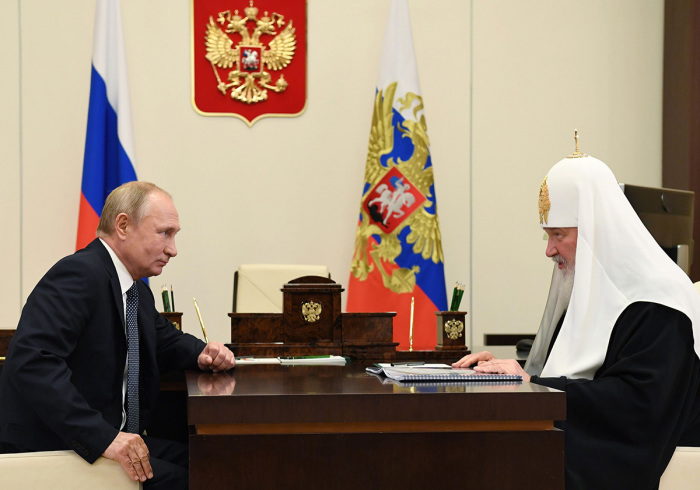
The head of the Russian Orthodox Church recently commended Vladimir Putin over his handling of church and state relations despite concerns from human rights advocates about religious persecution in Russia.
Patriarch Kirill of Moscow wrote a letter to the Russian president celebrating the 25th anniversary of when Putin first became head of state, calling it "a whole new era in Russia's history."
"I would like to express my profound gratitude for the relationship between Church and State that has taken shape with your active support — a relationship without precedent in our nation's history," wrote Kirill, as quoted by The Orthodox Times.
"The fruitful dialogue between government and Church, fostered with your support, not only helps address daily challenges but also plays a vital role in the moral renewal and transformation of society."
Kirill commended Putin for purportedly advancing "significant progress in the socio-economic and scientific-technical development of the country," unleashing "vast intellectual and cultural potential."
Kirill has been a staunch supporter of Putin, as well as the Russian invasion of Ukraine, which he labeled a "holy war" that is crucial to "defending the unified spiritual space of Holy Russia."
The World Russian People's Council, which Kirill leads, issued a statement last year claiming that the invasion launched in 2022 was a struggle against the "criminal Kiev regime" and Western-based "Satanism."
While Kirill has been supportive of Putin, others have expressed concern over the extent of persecution in Russia, especially of Christian groups who do not belong to the Russian Orthodox Church and other religious minorities.
Open Doors, a Christian persecution watchdog group that monitors persecution in over 60 countries, released a report in January finding that persecution in Russia includes Christians living in Muslim-majority parts of the country, as well as "unregistered churches" that engage in evangelism.
"The 'military campaign' launched by Russia in Ukraine on 24 February 2022 has led to an increase in state surveillance. Any form of criticism (even from Christians who opposed the invasion of Ukraine on religious grounds) has been immediately dealt with by the authorities and punished," noted the report.
"Russian people are immensely proud of their culture and history and this has consequences on a religious level as well: While Russian Orthodoxy is regarded as typically Russian, Roman Catholicism and especially Protestantism are seen as Western and alien."
The report highlighted several instances in which Christians critical of Putin have faced backlash, such as the October 2023 raiding of a non-Moscow Patriarchate Russian Orthodox Church in the southern Krasnodar Region after their clergy spoke out against the war in Ukraine. A priest was attacked and charged with "disobeying a police officer" and "discrediting the Russian Armed Forces."
In February 2024, a priest in St. Petersburg suffered a stroke after being arrested for planning a funeral service for Kremlin critic Alexei Navalny.
In May 2024, the city government in Slavyansk-na-Kubani lodged a civil lawsuit against Archbishop Viktor Pivovarov, who heads an independent Orthodox parish in the southern Krasnodar Region, on the grounds that his church is unauthorized and must be demolished.
Last August, the bipartisan U.S. Commission on International Religious Freedom warned that Russia is among countries using disinformation to suppress the rights of religious minorities.
The Russian government has labeled a variety of religious groups as "neo-pagan cults," the commission notes, including the Protestant Word of Life Church. Additionally, a Russian government-supporting television channel claimed Jehovah's Witnesses were "stockpiling ammunition and threatening Russian war efforts in Russian-occupied Crimea."
Since Russia enacted a ban on evangelism outside of churches under the guise of thwarting extremism in 2016, many Evangelical Protestants, as well as Muslims, have faced convictions and fines.